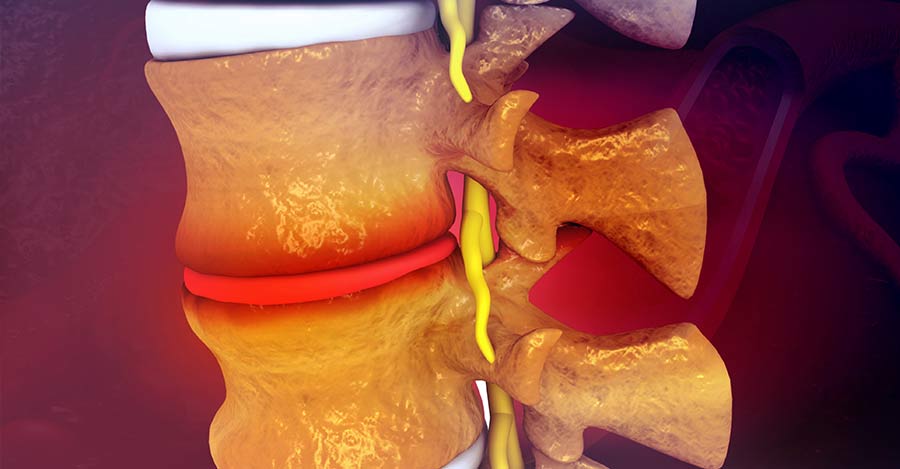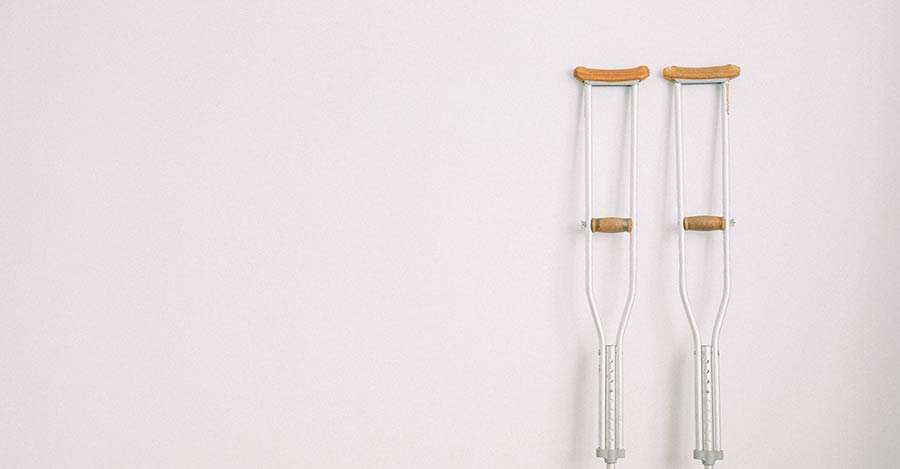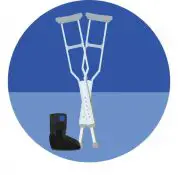Slipped (Herniated) Disc: Symptoms, Causes and Treatment
Are you suffering from bad back pain and wondering what the cause could be? You may be suffering from a slipped disc injury and not realize it.
This article will look at what a slipped disc is and the common causes and symptoms. It will also examine the treatment options available. We will also discuss the ways you can do to prevent a slipped disc injury.
What Is A Slipped Disc?

To understand a slipped disc, you need to know a bit more about your spine. Your spinal column has 24 bones that are stacked one atop of the other top to bottom. Every one of these bones is cushioned by a disc.
These discs protect your spinal bones by absorbing shocks that you experience when performing a variety of activities. Each disc protecting your spinal bones has two sections. One section is a gelatinous inner portion, while the other section is the rigid outer ring.
When you injure your back and affect one of the discs supporting your spine, it can cause the inner gelatinous part of a disc to come through the rigid outer ring. When this injury occurs, it is known as a slipped, prolapsed, or herniated disc.
Causes Of A Slipped Disc
Slipped disc injuries usually happen with gradual aging and general muscle and bone wear associated with every day activities. When we age, the discs supporting our spinal bones become more flexible. When discs are more flexible, they are more likely to rupture, twist, strain, tear, and slip.
Besides age, some of the other causes of a slipped disc include:
- Using the muscles in your back instead of leg muscles when lifting heavy objects.
- Certain motions such as when you twist or turn your body while lifting items.
- Certain traumatic events such as a hit to the spine from a car accident or a fall at work.
Risk Factors Associated With Slipped Disc injuries

Certain risk factors are associated with you suffering a slipped disc injury. You will find some of the common risk factors below.
- A person’s genetics: Some people are more inclined to developing a slipped disc based on their genetic makeup.
- A person’s weight: Those who are obese or overweight cause extra stress on the discs in their lower backs.
- A person’s smoking habit: Doctors believe that smoking causes less oxygen to travel to and supply a person’s discs. This causes a person’s discs to degenerate faster.
How A Slipped Disc is Diagnosed ?
Often the best way to determine if you have a slipped disc is to see a doctor. A doctor will do a thorough physical exam to find the exact source of your back pain. They will likely begin the exam by prodding your back to find any painful spots.
Additionally, they could ask you to lie on your back and move your legs in a particular fashion. A doctor could also check your knee and ankle reflexes, the strength of your legs, if you can feel light touches.
Yet, a physical exam is not the only test that they will need to conduct to establish if you have a slipped disc injury. Often a doctor will want to run one or more of the following tests. An X-ray, CT scan, discogram, MRI, myelogram, or electromyogram. After performing a physical exam and scans, they can determine if you have a slipped disc.
Symptoms Of A Slipped Disc
Contrary to what is popularly thought, you can have a slipped disc in any part of your spine, not just your lower back. Below you will find some of the symptoms you could have if you have a slipped disc injury.
- Muscle weakness that you cannot explain.
- Pain that radiates from your arms or legs.
- Burning, tingling, and aching sensations in your back.
- Pain that worsens in the evening or when performing certain activities.
- Pain when walking short or far distances.
- Radiating pain into your legs.
- Pain that gets much worse after standing or sitting.
- Neck pain.
Treatment Options Available For A Slipped Disc Injury
A slipped disc is a serious injury that can worsen if left untreated. Yet, many treatment options are available.
Rest

Before, it was a common belief that slipped disc injuries needed rest. Although you should rest with this injury, you need to ensure you continue with your daily tasks. According to recent medical studies, if you keep active, you are likely to recover quicker. You will also be less prone to developing chronic back pain.
Ice
One of the very best ways you can treat a slipped disc injury is to apply ice to the hurt area. Ice is highly effective at both reducing swelling and numbing pain. Yet, ice is not a long-term treatment option. You should not excessively apply ice to your back as this can make the injury worse.
Medication
Over-the-counter and prescription medicine is a helpful treatment option. When taken regularly, medication can be a useful tool in combating pain felt with this type of injury.
Often the best medications include anti-inflammatories like Ibuprofen, naproxen, and diclofenac. Other useful medicines are weak opioids like codeine.
Sometimes you might need to take medicine for neuropathic pain such as amitriptyline. This type of medicine is usually only given if the pain is lasting for a few days.
Stretching and Exercise
Those with a slipped disc should engage in stretches and exercise. It is crucial to the recovery process. Stretching and exercise lessen the pain you feel. It also strengthens the various muscles that support your spine. Usually, a physiotherapist can tell you the best exercises and stretches to help you.
Surgical Treatment For A Slipped Disc

Surgery is not the first treatment available to those suffering from a slipped disc. Usually, this kind of injury will resolve itself within six weeks. Nine out of ten people will recover from a slipped disc injury without needing surgery.
A doctor will only consider providing surgery as a treatment option if your injury has not improved or has gotten worse for longer than six weeks. Or a doctor will advise you to have surgery if a slipped disc injury affects your muscle function.
During your surgery, a surgeon will remove the damaged or protruding section of the disc. Yet, they won’t altogether remove the whole disc. Sometimes a surgeon will altogether remove a disc and replace it with an artificial one. They might also remove the disc and fuse your vertebrae without putting in an artificial one.
Recovering From Slipped Disc Surgery
When you are recovering from a slipped disc injury, you will need to rest but remain mobile. Often the only way you can do this is with the use of mobility aids. The usual recovery period for someone who has a slipped disc surgery is generally four weeks.
Unfortunately, it is not known yet if those who have a slipped disc surgery are better off. In many cases have seen that the surgery provides short-term relief but provides no long-term solution.
8 Tips For Preventing Slipped Disc injuries
Fortunately, in most instances, you can prevent a slipped disc injury from occurring. There are ways that you can reduce your risk of suffering from this type of injury. Below are some tips to consider if you don’t want to suffer from a slipped disc injury.

Ensure you practice good posture.
Try to maintain a healthy weight and appropriate BMI.
Keep your muscles flexible.
Engage in frequent stretching and exercises.
Ensure you always lift items properly with your leg muscles and not your back muscles.
Always change positions frequently.
If you are someone that smokes, quit smoking.
Refrain from wearing high-heeled shoes.
Will Crutches Help A Slipped Disc Injury?

One of the best mobility aids that helps manage pain and aids in the recovery of slipped disc injuries is crutches. Regardless of if you have a slipped disc injury for a short while or for a long time, crutches can help you. Additionally, crutches are an excellent mobility aid for those who have had surgery for their injury. This is because crutches help alleviate the pressure on one’s back.
Yet, it should be noted that not all types of crutches work well with slipped disc injuries. So it is better to speak with your healthcare practitioner to confirm the best crutches for you.
Final Words
A slipped disc injury can be excruciating and usually has a negative impact on a person’s life. If you are aware of the symptoms, causes, and treatment options, you will better understand slipped disc injuries. This means that should you ever find yourself suffering from a few of the symptoms, you will know to go to a doctor, and you will know what to expect.
Usually, this type of injury heals with the proper treatment solutions in six weeks, but sometimes you could need surgery. Yet, you don’t need to worry excessively as most people don’t need this drastic treatment option. Additionally, if you’re in pain or need to be mobile while healing, you should consider using crutches as they are an excellent mobility aid.
Furthermore, there are ways you can prevent a slipped disc injury. Should you follow the tips we gave, you will be less likely to sustain this kind of injury.


